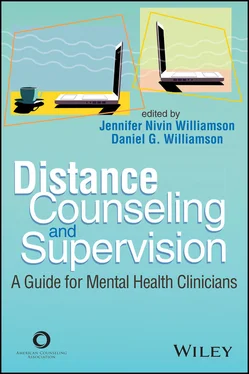Distance Counseling and Supervision
Здесь есть возможность читать онлайн «Distance Counseling and Supervision» — ознакомительный отрывок электронной книги совершенно бесплатно, а после прочтения отрывка купить полную версию. В некоторых случаях можно слушать аудио, скачать через торрент в формате fb2 и присутствует краткое содержание. Жанр: unrecognised, на английском языке. Описание произведения, (предисловие) а так же отзывы посетителей доступны на портале библиотеки ЛибКат.
- Название:Distance Counseling and Supervision
- Автор:
- Жанр:
- Год:неизвестен
- ISBN:нет данных
- Рейтинг книги:5 / 5. Голосов: 1
-
Избранное:Добавить в избранное
- Отзывы:
-
Ваша оценка:
- 100
- 1
- 2
- 3
- 4
- 5
Distance Counseling and Supervision: краткое содержание, описание и аннотация
Предлагаем к чтению аннотацию, описание, краткое содержание или предисловие (зависит от того, что написал сам автор книги «Distance Counseling and Supervision»). Если вы не нашли необходимую информацию о книге — напишите в комментариях, мы постараемся отыскать её.
*To purchase print copies, please visit the ACA website here
*Reproduction requests for material from books published by ACA should be directed to permissions@counseling.org
Distance Counseling and Supervision — читать онлайн ознакомительный отрывок
Ниже представлен текст книги, разбитый по страницам. Система сохранения места последней прочитанной страницы, позволяет с удобством читать онлайн бесплатно книгу «Distance Counseling and Supervision», без необходимости каждый раз заново искать на чём Вы остановились. Поставьте закладку, и сможете в любой момент перейти на страницу, на которой закончили чтение.
Интервал:
Закладка:
Discretion should be exercised when using and sharing social media. Counselors should never share confidential information in private or public chats and forums. They should refrain from diagnosing anyone even if they are historical or public figures. Counselors should avoid posting anything they would not say in real life (ACA Government Affairs, n.d.). Although venting about difficulties or frustration is common on social media platforms, it is recommended that counselors refrain from posting anything that would be deemed derogatory or unprofessional. Although separate accounts are recommended, there are times when personal social media accounts might be reviewed for jobs or for professional service (i.e., by state licensure boards, state committees, etc.).
Although it is common practice in social circles to research new people on social media, the ACA Code of Ethics (ACA, 2014) forbids counselors from exploring clients’ social media without written consent. This has been likened to peeping into a client’s living room windows without having been invited.
The risks of using social media should also be assessed. Counselors who use social media applications should remain aware of how the permissions settings in the platform function when creating social media accounts. Access to confidential client information might be allowed unintentionally. Most user agreements give access to other elements of the user’s device, including contacts, photos, and other content. Client information might be vulnerable to snooping and unintentionally breached. Doffman (2019) cautioned that appropriate protection from social media applications comes down to the users themselves.
Voice-Assisted Technology, Bluetooth, and Gaming Communication on Devices
On many mobile devices, such as cell phones and tablets, voice-assisted technology is common. Arcuri Sanders (2020) noted that many are familiar with Apple’s Siri, Amazon’s Alexa, and Google’s Assistant, and it is important to know that when voice-assisted technology is enabled, the device may be constantly listening. This can create an issue for counselors who use technology as well as for any technology that may enter a counseling office. Voice-assisted devices are designed to listen for commands and to hear information to adapt and customize services to the individual user. Clients, office staff, and counselors could be breaching confidentiality without realizing that this is happening. A few steps can be taken to help safeguard clients’ privacy and limit this digital snooping. First, it is imperative that counselors turn off voice-assisted technology that is connected to Wi-Fi, cell phones, tablets, computers, and any other electronic devices. Second, they should craft policies that instruct clients to turn off voice-assisted technology, especially in situations in which they may compromise others’ confidentiality as well as their own (e.g., group counseling settings). Finally, counselors should include in the informed consent language that outlines the risks of voice-assisted technologies and instructions for clients to temporarily disable those services (Arcuri Sanders, 2020).
Bluetooth connections might also unintentionally compromise the confidentiality of clients. Counselors must encourage clients to be aware of their Bluetooth connections and to take measures to avoid unintentional breaches of confidentiality. For example, if a client is accessing counseling services through a videoconferencing app on their phone, and the phone is linked to their car’s Bluetooth, anyone in the car might have access to the session. Programs that run in the background might also pose a risk to clients. For instance, programs such as Discord and Overtone, which are used to communicate in online gaming, often run in the background and might be such an integral part of clients’ social life that they do not remember to disable them while engaging in telebehavioral health services. This is another consideration worth mentioning during intake and informed consent, especially when the client identifies as a gamer.
Informed Consent
One of the most critical elements of risk management is a thorough addition to a standard informed consent. The ACA Code of Ethics (ACA, 2014) recommends that the document contain the typical components of a face-to-face counseling informed consent with the following additional elements.
Distance Counseling Credentials
Many states have requirements for specific training or continuing education. Distance counseling training and credentials should be clearly outlined.
Physical Location of the Practice and Contact Information
Although mailing addresses and phone numbers are typically included in an informed consent, it is imperative to include the physical location of the counseling practice, even when one is meeting primarily in an online format. This has legal implications on various levels. If the counselor will practice in a location outside of the practice, this should be disclosed.
Time Zone
Counselors should identify any differences in time zone between themselves and their clients. (This can be an issue in some states, even when one is providing face-to-face counseling.)
Risks and Benefits of the Use of Distance Counseling Technology
The risks and benefits of using an online modality should be outlined in the informed consent. Risks include the possibility that the technology could malfunction in the middle of a session, the fact that the counselor cannot guarantee privacy or complete confidentiality, and the fact that several safeguards will be in the hands of the client. Benefits include greater accessibility and convenience.
Social Media Policy
It is recommended that all informed consent documents outline the clinician’s policies on the use of social media, as it is a ubiquitous form of communication in modern society. Counselors should outline the appropriate use of social media, especially if they maintain any kind of online presence personally or professionally. Therapists should outline how friend requests and other types of social media outreach will be handled as well as whether they are comfortable with websites that rate therapists. Counselors must make it clear to the client that personal virtual relationships with clients are forbidden by the ACA Code of Ethics (ACA, 2014) and clarify how contact is typically handled when they and their clients occupy the same virtual space.
Emergency Procedures
It is imperative that a plan be created for emergency procedures. Online counseling relationships must begin with the possible ends in mind. Clients should identify where they are physically located at the beginning of each session and should provide emergency contacts within a 5- to 10-minute radius who will be available in the event of an emergency. In addition, there should be a record of the closest emergency services (fire, ambulance, police). The more fragile the client, the more comprehensive the plan must be.
Anticipated Response Times
In an age when the public has grown more comfortable with 24/7 availability and service, it is important for counselors to identify when they are and are not available and how quickly they will respond to clients. An alternative plan should be in place for times when the counselor is not available.
Cultural or Language Differences
It is important that counselors in a digital age recognize the potential for serving a larger population. Language and cultural differences should be clearly articulated. If a translator will be used, this should be outlined in the informed consent. Additional releases may be required.
Читать дальшеИнтервал:
Закладка:
Похожие книги на «Distance Counseling and Supervision»
Представляем Вашему вниманию похожие книги на «Distance Counseling and Supervision» списком для выбора. Мы отобрали схожую по названию и смыслу литературу в надежде предоставить читателям больше вариантов отыскать новые, интересные, ещё непрочитанные произведения.
Обсуждение, отзывы о книге «Distance Counseling and Supervision» и просто собственные мнения читателей. Оставьте ваши комментарии, напишите, что Вы думаете о произведении, его смысле или главных героях. Укажите что конкретно понравилось, а что нет, и почему Вы так считаете.












